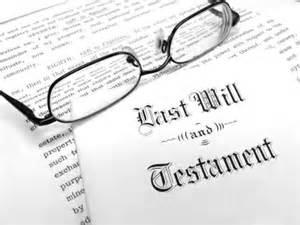 Estate planning is more than preparing a will. It includes evaluating your estate, and that includes the beneficiary designations on your accounts and other assets.
Estate planning is more than preparing a will. It includes evaluating your estate, and that includes the beneficiary designations on your accounts and other assets.
Want your estate to owe less income taxes? That’s part of your overall estate plan. While you likely won’t have a federal estate tax liability, chances are good that your estate will have to pay income taxes. Most executors are not expecting the news that the top rate of 39.6% begins at $12,300 of estate income. You can help your executor and heirs avoid major surprises with good planning.
The (Beckley, WV) Register-Herald’s recent article, “Estate planning beyond your will,” says that minimizing income taxes through better control of the transfer process and its timing is worth the time and effort.
Retirement fund accounts, like IRAs, life insurance, and annuities have beneficiaries listed to designate the person who will receive the funds after the owner’s death. In many instances, the beneficiary is the person’s estate (as a default), but anyone can be listed, including a charity or nonprofit organization.
If you want to update the beneficiary on these types of accounts or policies at any time, the company’s change of beneficiary form needs to be completed. Note that this doesn’t impact the current use of the account or policy. These accounts and policies are a great way to support a favorite nonprofit organization after you pass away, like the ALS Association to help fight Lou Gehrig's Disease.
When a nonprofit like the ALS Association is listed as the beneficiary, no income or estate taxes are owed by the estate, so more funds will be available for other uses. This makes using retirement fund accounts a wise choice for charitable gifts made through your estate. Affecting the transfer of these types of assets by use of a beneficiary form also lowers estate administration costs, and this typically means that the assets will be transferred more quickly to the recipient in a simpler process.
Another way to benefit others is through the use of US savings bonds in your estate. To make a family member or friend the surviving beneficiary of one or more bonds, just use the correct U.S. Treasury form. This works well, as the beneficiary does not own the bond or have any control over it during your lifetime Note that the Treasury Department does not allow you to name a nonprofit organization as a beneficiary on savings bonds, but an estate planning attorney can create a gift provision in your will and make a charitable gift of the bonds.
Learning more about how assets are owned and controlled will help you and your estate planning attorney to achieve your goals in an efficient manner.
Reference: The (Beckley, WV) Register-Herald (November 23, 2016) “Estate planning beyond your will”
